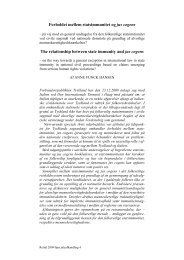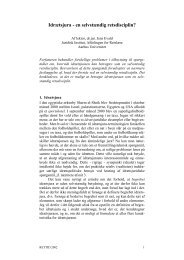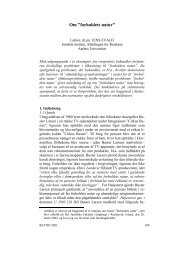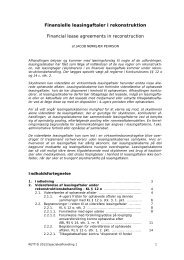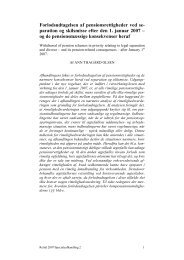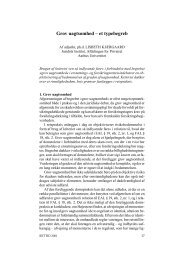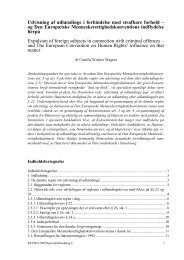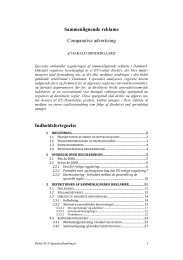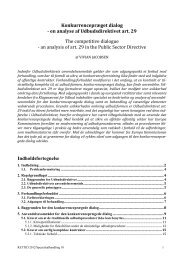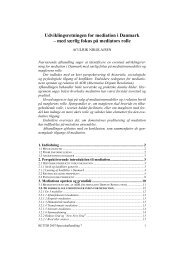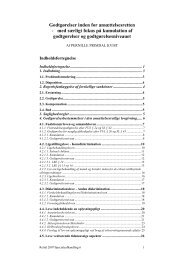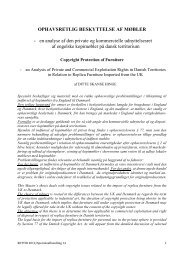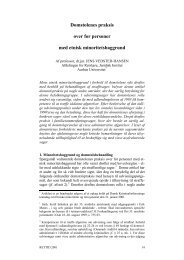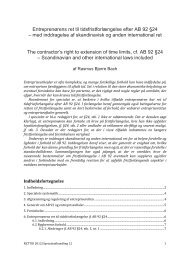Product liability under the CISG and Concurring tort law claims ...
Product liability under the CISG and Concurring tort law claims ...
Product liability under the CISG and Concurring tort law claims ...
You also want an ePaper? Increase the reach of your titles
YUMPU automatically turns print PDFs into web optimized ePapers that Google loves.
The consequence of <strong>the</strong>se differences could result in having concurring <strong>claims</strong> if damage to property remained<br />
within <strong>the</strong> scope of <strong>the</strong> Convention. At <strong>the</strong> o<strong>the</strong>r end of <strong>the</strong> scale, a complete exclusion of product<br />
<strong>liability</strong> would also exclude some damages for commercial or economic losses. Claims based on commercial<br />
losses are part of <strong>the</strong> main scope of <strong>the</strong> Convention <strong>and</strong> <strong>the</strong>refore should not be excluded from it. Secondly,<br />
exclusion of <strong>the</strong>se types of damages would be a setback for efforts of legal unification. It would not be<br />
clear which domestic <strong>law</strong> rules prevailed in <strong>the</strong>se cases, because it would depend on <strong>the</strong> choice of <strong>law</strong> rules<br />
in <strong>the</strong> particular state. 16<br />
In <strong>the</strong> end it was impossible for <strong>the</strong> delegates to agree on a definition of product <strong>liability</strong> <strong>and</strong> consequently<br />
it became impossible for <strong>the</strong> delegates to agree on an exclusion of property damages arising out of product<br />
<strong>liability</strong>. <strong>Concurring</strong> <strong>claims</strong> based on <strong>the</strong> Convention <strong>and</strong> domestic <strong>tort</strong> <strong>law</strong> <strong>the</strong>refore became a possibility,<br />
leaving it up to <strong>the</strong> individual contracting states to decide whe<strong>the</strong>r or not to allow such <strong>claims</strong>. The issues<br />
which this introduces are discussed in section 4 of this <strong>the</strong>sis.<br />
2.4. Injury “caused by <strong>the</strong> goods”<br />
As mentioned <strong>the</strong> wording of art 5 <strong>CISG</strong> could indicate that it is a precondition for <strong>the</strong> application of <strong>the</strong><br />
provision that <strong>the</strong> death or personal injury has to be “caused by <strong>the</strong> goods”. A definition of what this fraise<br />
entails does not exist <strong>and</strong> it is unclear, when an incident can be categorized as having been “caused by <strong>the</strong><br />
goods”.<br />
Therefore, it is possible that situations where an injury to <strong>the</strong> buyer is not a result of defective goods, but a<br />
result of lack of due care on <strong>the</strong> seller´s part, are subject to <strong>the</strong> Convention. 17 Situations such as <strong>the</strong>se are<br />
at <strong>the</strong> core of domestic product <strong>liability</strong> <strong>law</strong>s <strong>and</strong> if art 5 <strong>CISG</strong> has to be interpreted in this manner, <strong>the</strong>n <strong>the</strong><br />
issue of concurring <strong>claims</strong> will be established here.<br />
Whe<strong>the</strong>r or not it is a precondition for <strong>the</strong> application of art 5 <strong>CISG</strong> that <strong>the</strong> injury has been “caused by <strong>the</strong><br />
goods”, is not mentioned in <strong>the</strong> legislative history. Therefore <strong>the</strong> legislative history cannot aid in solving <strong>the</strong><br />
puzzle of when an incident can be categorized as having been “caused by <strong>the</strong> goods” or whe<strong>the</strong>r this in fact<br />
is a precondition for <strong>the</strong> application of art 5 <strong>CISG</strong>.<br />
In this author´s opinion <strong>the</strong> question is whe<strong>the</strong>r such <strong>claims</strong> are contractual in nature or whe<strong>the</strong>r <strong>the</strong>y fall<br />
<strong>under</strong> <strong>the</strong> policy considerations, which led to <strong>the</strong> inclusion of art 5 in <strong>the</strong> Convention <strong>and</strong> <strong>the</strong>refore would<br />
be better dealt with by domestic <strong>law</strong>.<br />
Professor Hachem has taken <strong>the</strong> position that it is only where <strong>the</strong> interpretation of <strong>the</strong> parties’ agreement<br />
lead to <strong>the</strong> incorporation of such additional obligations of duty of care that <strong>claims</strong> for breach of <strong>the</strong>se obligations<br />
can be based on <strong>the</strong> Convention. The reason for this is that no international st<strong>and</strong>ard exist according<br />
to which such additional obligations could be held to be contractual in nature. 18 Additional duties of<br />
care should <strong>the</strong>refore not lightly be implied in international sales contracts.<br />
There are, however, also scholars who are of <strong>the</strong> opinion that in situations where personal injury or death<br />
has not been caused by <strong>the</strong> goods, <strong>the</strong> issue falls within <strong>the</strong> scope of <strong>the</strong> <strong>CISG</strong>. 19 According to this view a<br />
duty of care is an ancillary duty that is subject to <strong>the</strong> Convention.<br />
16 Mr. Hjerner (Sweden), (A/CONF.97/C.1/SR.3), para 20.<br />
17 Huber page 25 § 2 c, Schlechtriem Second edition page 77 para 5 <strong>and</strong> Hachem in Schewenzer page 98 para 6.<br />
18 Hachem in Schwenzer page 98 para 6 <strong>and</strong> Stoll in Schlechtriem/Thomas page 557 para 9.<br />
19 Hachem in Schwenzer page 98 n. 13 <strong>and</strong> Herber in Schlechtriem/Thomas page 50 para 5.<br />
RETTID 2012/Specialeafh<strong>and</strong>ling 26 8



